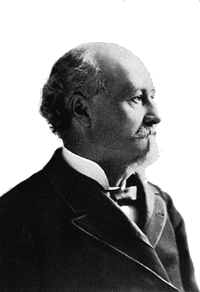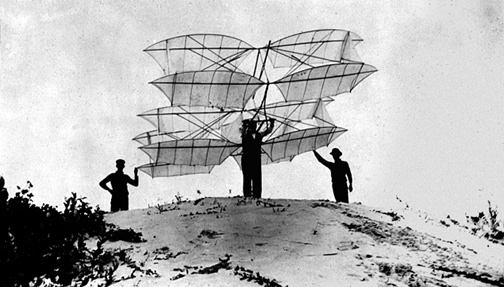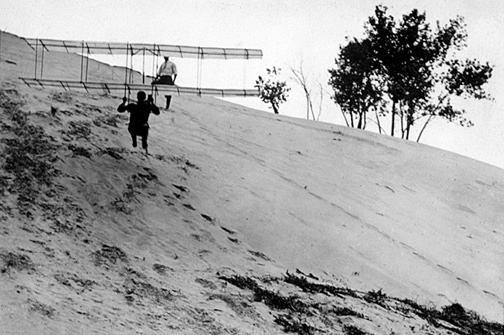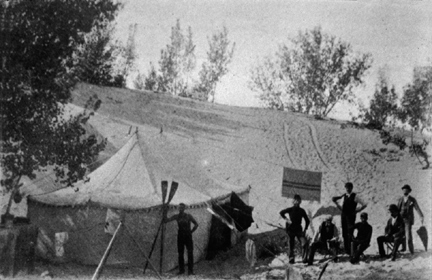


Octave Chanute (1832-1910), born in France, was a naturalized American. He was a talented and highly-successful civil engineer. Chanute designed the first bridge (railroad) over the Missouri River and designed the Union stockyards in Chicago and Kansas City.
Following his early retirement, Chanute took up a never-ending campaign to champion the invention of the airplane. He acted as a tireless publicist, collecting information from all corners of the globe and sending out information to all askers. Of particular import, his long correspondence with Louis Mouillard. Further, the interest of a prominent engineer in matters of aviation lent a considerable respectability to the nascent field.
In 1894, Chanute published a compendium of early aviation experiments, Progress in Flying Machines, that was widely read and respected.
In 1896, Chanute became an even more active participant, commissioning
several craft in 1896 which were contsructed in William Avery's shop.
Chanute's favorite was the ![]() Katydid,
which featured multiple wings that could be moved about on the fuselage to
facilitate experimentation.
Katydid,
which featured multiple wings that could be moved about on the fuselage to
facilitate experimentation.

Chanute's Kaytdid glider
A second machine, built late in 1896, was the ![]() Chanute/Herring
Biplane, a small but relatively sturdy glider that employed Pratt trussing
to achieve its considerable strength. Both Herring and Chanute contributed to
the design, which proved influential -- the Wright brothers copied their
gliders after the basic structure of this glider, for example.
Chanute/Herring
Biplane, a small but relatively sturdy glider that employed Pratt trussing
to achieve its considerable strength. Both Herring and Chanute contributed to
the design, which proved influential -- the Wright brothers copied their
gliders after the basic structure of this glider, for example.

The Chanute-Herring glider in flight

Camp at the Indiana Dunes
The Wrights began a long association with Chanute when Wilbur turned his talents to the invention of the airplane in 1899. The Wrights corresponded with Chanute on a routine basis, spelling out their thoughts to him in careful detail. Chanute unfortunately had only an incomplete understanding of the Wrights' efforts, but his encouragement doubtless helped the brothers motivations in times of trouble. Chanute also witnessed many of the early Wright flights, including the 1902 glider and 1904 and 1905 powered flyer.
Chanute became estranged from the Wrights during their efforts to sell their airplane. He did not seem to realize the magnitude of their accomplishment, and urged the brothers to sell their ideas at a bargain price. The two brothers, fully cognizant of the import of their work, demurred. About the time of his death, Chanute and the Wrights were working towards a reconciliation.
| OR |
visit an excellent off-site resource
The Octave
Chanute Pages. Specific links to this site are available wherever the
symbol  appears. appears.
|